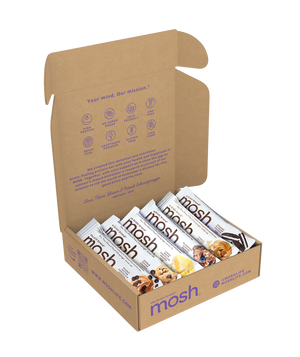Disclaimer: This article is intended for informational purposes only, and is not intended to diagnose or provide treatment instructions for any health condition. Always seek guidance from your healthcare provider before changing your diet, medication, or supplement plan.
Navigating the intricate world of gut health can be complex, especially when faced with conditions like small intestinal bacterial overgrowth (SIBO). The importance of following a tailored elimination diet, such as the SIBO diet or a low FODMAP diet, in managing such conditions cannot be overstated.
These dietary changes aim to restore balance in the gut, minimize symptoms such as bloating and abdominal pain, and ultimately improve quality of life. In this comprehensive guide, we'll explore the ins and outs of a SIBO diet, from understanding fermentable carbohydrates to adopting dietary strategies that support your digestive system and overall wellness.
We'll also delve into the impact of artificial sweeteners, probiotics, and supplements on gut health, and how managing your diet can positively influence other digestive disorders such as Irritable Bowel Syndrome (IBS) and Celiac Disease.
What Is Small Intestinal Bacterial Overgrowth (SIBO)?
Small intestinal bacterial overgrowth, commonly referred to as SIBO, is a digestive disorder characterized by the excessive presence of bacteria in the small intestine.
The small intestine, a crucial component of the digestive system, is responsible for the absorption of most nutrients from the food we eat. It normally contains a relatively low number of bacteria compared to the large intestine or colon. With SIBO, the bacterial population in the small intestine is unusually high, disrupting nutrient absorption and causing a variety of symptoms.
Common SIBO symptoms often mirror those of other gastrointestinal conditions, making it somewhat challenging to diagnose without specific tests, like the breath test.
Some prevalent symptoms include:
-
Bloating and abdominal pain: These are some of the most common symptoms of SIBO, caused by excess bacteria in the small intestine producing gas.
-
Constipation or diarrhea: The overgrown bacteria can affect gut motility, leading to either slowed or rapid transit through the digestive tract.
-
Malnutrition and weight loss: SIBO can interfere with the absorption of nutrients, causing deficiencies and unintentional weight loss.
- Fatigue: A result of malnutrition and the body's constant struggle to cope with bacterial overgrowth.
What Is a SIBO Diet?
A SIBO diet is a dietary plan designed to manage and alleviate the symptoms of SIBO. While it does not replace the need for medical treatment, it can play an important role in managing the condition and promoting gut health. The aim is to limit foods exacerbating symptoms or contributing to further bacterial overgrowth.
Dietary changes are pivotal in managing SIBO symptoms because certain foods can ferment in the small intestine, promoting bacterial growth and worsening bloating and discomfort. A well-planned SIBO diet can help reduce this fermentation and control bacterial overgrowth, relieving symptoms and supporting overall wellness.
Foods Commonly Included in the SIBO Diet:
-
Lean meats: Protein sources like chicken, fish, and turkey are easily digestible and do not contribute to bacterial overgrowth.
-
Certain vegetables: Non-starchy vegetables like spinach, zucchini, and bell peppers are less likely to ferment in the small intestine.
-
Low-lactose dairy or lactose-free alternatives: These can be better tolerated by individuals with SIBO than products containing lactose.
- Certain grains: Rice and quinoa may be tolerated on a SIBO diet, depending on the individual.
Foods Commonly Avoided in the SIBO Diet:
-
High FODMAP foods: These are types of carbohydrates that can cause excessive fermentation. Foods like onions, garlic, apples, and wheat should be limited.
-
Artificial sweeteners: These can contribute to bacterial overgrowth and exacerbate symptoms.
-
Certain legumes: Foods like lentils and chickpeas may increase bloating and other symptoms due to their high fiber content.
- Dairy products with lactose: Lactose can be difficult for those with SIBO to digest and may worsen symptoms.
A SIBO diet should always be tailored to the individual's needs and tolerances under a healthcare provider's or registered dietitian's guidance. The main aim is to help manage symptoms, support gut health, and enhance the quality of life for those living with SIBO.
Why Is a Low-FODMAP Diet Recommended for SIBO Patients?
For individuals experiencing symptoms of Small Intestinal Bacterial Overgrowth, dietary modification can be a crucial part of symptom management. One commonly recommended diet is the low FODMAP diet.
Understanding FODMAPs
FODMAP is an acronym that stands for Fermentable Oligosaccharides, Disaccharides, Monosaccharides, and Polyols. These are types of carbohydrates that are notorious for their fermentable nature, meaning they can cause excessive gas production when broken down by gut bacteria.
Eating high levels of FODMAPs can exacerbate symptoms like bloating, stomach pain, and constipation in individuals with SIBO and other gastrointestinal issues such as irritable bowel syndrome (IBS).
Role of the Low-FODMAP Diet in Managing Gastrointestinal Issues
The role of the low FODMAP diet is to limit the intake of foods rich in these fermentable carbohydrates, thus minimizing the fermentable substrates available to the gut bacteria. This can help to manage bloating, abdominal pain, and other symptoms commonly associated with conditions like SIBO and IBS. For some, it may even contribute to weight loss.
High-FODMAP Foods To Avoid and Low-FODMAP Foods to Consume
Avoid: Foods high in FODMAPs include many fruits like apples and peaches, certain vegetables like onions and artichokes, dairy products containing lactose, wheat and rye, legumes, and sweeteners like high-fructose corn syrup and sorbitol.
Consume: On the other hand, low FODMAP foods include meats, fish, certain fruits like bananas and oranges, vegetables like bell peppers and carrots, lactose-free dairy or dairy alternatives, gluten-free grains, and sweeteners like glucose.
What Other Dietary Strategies Are Beneficial in Managing SIBO?
Beyond a low FODMAP diet, other dietary strategies can also prove beneficial for managing SIBO.
The Specific Carbohydrate Diet (SCD)
The specific carbohydrate diet (SCD) is a restrictive diet plan that eliminates complex carbohydrates and focuses on natural, nutrient-rich foods. The theory behind SCD is that complex carbohydrates are harder to digest, potentially causing bacterial overgrowth and contributing to SIBO symptoms.
The Elemental Diet
The elemental diet is another dietary approach sometimes used in SIBO treatment. This involves consuming pre-digested nutrients that require minimal breakdown by the digestive tract, thus reducing the fuel available to bacteria in the small intestine. An Elemental Diet is usually prescribed by a healthcare professional and followed for a limited period due to its restrictive nature.
Probiotics and Prebiotics
The role of probiotics and prebiotics in gut health should not be underestimated. Probiotics are beneficial bacteria that can help maintain a healthy balance in your gut, potentially reducing SIBO symptoms. Prebiotics are types of fiber that feed the good bacteria in your gut, helping them thrive.
-
Probiotics: These can be found in fermented foods such as yogurt, sauerkraut, and kimchi.
- Prebiotics: Foods like garlic, onions, asparagus, and whole grains are rich in prebiotics.
Bear in mind that while these diets and strategies may help manage SIBO symptoms, they should be undertaken under the guidance of a healthcare professional or dietitian to ensure nutritional adequacy and overall health.
Why Should Certain Carbohydrates and Sweeteners Be Limited?
In managing SIBO, understanding the role of certain carbohydrates and sweeteners is crucial.
Here's why they need to be limited.
The Connection Between Carbohydrates, Gut Bacteria, and SIBO
Carbohydrates, particularly certain types, play a pivotal role in SIBO as they serve as fuel for the bacteria in the gut. Simple carbohydrates, or sugars, are quickly absorbed in the small intestine.
Complex carbohydrates, including starches and legumes, may not be fully digested and can end up in the large intestine, where bacteria ferment them. This fermentation can lead to an increase in gas production, which contributes to the bloating and abdominal pain associated with SIBO.
Impact of Artificial Sweeteners and Sugar Alcohols on Gut Health
Artificial sweeteners and sugar alcohols, despite being low or zero calories, can have a negative impact on gut health. Some research suggests they alter the balance of gut bacteria and potentially exacerbate SIBO symptoms. They are also known to cause digestive issues such as bloating and diarrhea in some people.
Examples of Problematic Carbohydrates and Sweeteners
-
Problematic carbohydrates: Lactose (found in dairy), fructose (found in certain fruits, honey, and high-fructose corn syrup), legumes, starchy vegetables like potatoes, and whole grains.
- Problematic sweeteners: Artificial sweeteners such as aspartame and saccharin, sugar alcohols like sorbitol and xylitol.
Tips For Transitioning to the SIBO Diet
A diagnosis of SIBO and the dietary changes that come with it can be overwhelming. However, a measured approach can help smooth the transition.
Importance of Gradual Dietary Changes
Radical changes in your diet can be challenging and may lead to feelings of restriction or deprivation. Instead, try making gradual changes, such as introducing one new food at a time or slowly reducing the portion size of high FODMAP or problematic foods. This allows your digestive system to adjust and may help you identify specific food triggers.
The Role of a Registered Dietitian in Managing SIBO
A registered dietitian is a key resource when transitioning to a SIBO diet. They can provide individualized advice, taking into account your nutritional needs, food preferences, lifestyle, and symptoms. They can also help guide you through different phases of the diet, from the initial elimination phase to the reintroduction phase.
Incorporating Supplements Into a Sibo Treatment Plan
Supplements can play an important role in a SIBO treatment plan. They can help replenish nutrient deficiencies that may occur due to dietary restrictions or malabsorption issues associated with SIBO.
Probiotics, for example, can help maintain or restore a healthy balance of gut bacteria, while certain other supplements like digestive enzymes may aid digestion. However, seeking professional advice before starting any new supplement regime is important, as some may not be suitable for everyone.
Remember, managing SIBO is about more than just eliminating certain foods. It involves a holistic approach to wellness, aiming to improve gut health, alleviate symptoms, and enhance your overall quality of life. Always consult with healthcare professionals for personalized advice.
Can a SIBO Diet Improve Other Digestive Disorders like IBS or Celiac Disease?
Given the complexity of the digestive system, it's no surprise that there can be overlap between different digestive disorders.
Here's what you need to know about the potential connection between SIBO, IBS, and Celiac Disease, and the role of dietary modifications.
Connection Between SIBO, IBS, and Celiac Disease
Research has suggested a potential link between SIBO, IBS, and celiac disease. These conditions share common symptoms like bloating, abdominal pain, and changes in bowel movements, which may cause diagnostic confusion.
Studies have found that some people with IBS have undiagnosed SIBO, and SIBO is also more common in people with celiac disease. The shared symptoms and potential overlapping diagnoses highlight the importance of a comprehensive diagnostic process, which may include a breath test for SIBO, testing for IBS, and testing for celiac disease.
Dietary Modifications Beneficial for Gut Support Across These Conditions
A SIBO diet can benefit other digestive disorders due to its focus on reducing fermentable carbohydrates, which can help alleviate gastrointestinal symptoms regardless of the underlying cause.
A gluten-free diet, imperative for people with celiac disease, can also help some SIBO patients, especially if they’re sensitive to wheat. Moreover, a SIBO diet can often improve symptoms of IBS due to the overlap in symptom triggers, particularly when it comes to certain foods and gut bacteria.
It's crucial to remember that everyone's body is unique, and what works for one person may not work for another. Individualized dietary guidance from a registered dietitian or healthcare professional can help you navigate these dietary changes and find a plan that works best for your needs and overall wellness.
How Crucial Is a SIBO Diet in Managing SIBO Symptoms and Supporting Wellness?
As you can see, dietary modifications play a pivotal role in managing SIBO symptoms and enhancing wellness. A well-implemented diet can create an environment in the digestive tract that's less hospitable to overgrowing bacteria, thus helping to manage symptoms of bloating, constipation, and abdominal pain. Moreover, these diets can also improve other aspects of gut health, such as intestinal motility and permeability, often referred to as "leaky gut."
However, each person's SIBO experience and dietary responses are unique. What works for one might not work for another, highlighting the importance of individualized dietary guidance from a healthcare professional or a registered dietitian. They can help tailor a diet plan that considers your symptoms, food preferences, lifestyle, and nutritional needs, ensuring you manage your SIBO symptoms and achieve overall health and wellness.
We hope this guide has shed light on the potential benefits and challenges of a SIBO diet. Continue your journey to understanding gut health and how to manage SIBO through diet by exploring more articles on the MOSH blog.
Sources:
Small Intestinal Bacterial Overgrowth | NCBI Bookshelf
Small Intestine: Function, Anatomy & Definition | Cleveland Clinic
Fermented Foods, Health and the Gut Microbiome | PMC
FODMAP Diet: What You Need to Know | Johns Hopkins Medicine
Specific Carbohydrate Diet (SCD): How It Works & Benefits | Cleveland Clinic
Elemental Diet and The Nutritional Treatment of Crohn’s Disease | PMC
Probiotics | Health Professional Fact Sheet
Prebiotics: Definition, Types, Sources, Mechanisms, and Clinical Applications | PMC









